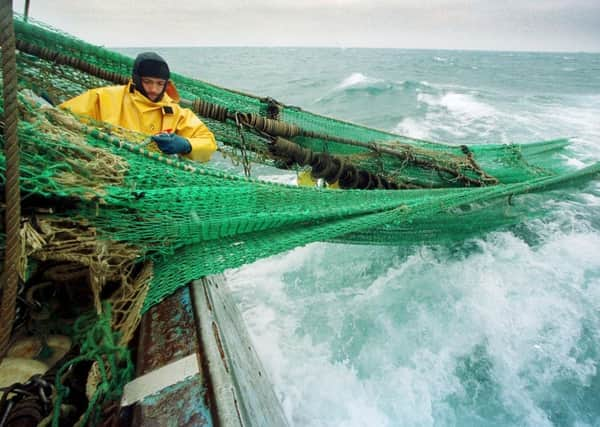Scots fishermen face tidal wave of red tape


Shetland does not look much on the map, a scattering of windswept islands and skerries across a remote part of the North Sea. But were you to draw up a picture of the UK in terms of its fishing industry, Shetland and the north-east of Scotland would far outweigh the rest of the country.
Shetland is second only to Peterhead as a UK fishing port, and more fish were landed in Shetland last year than in all of England and Wales combined.
Advertisement
Hide AdAdvertisement
Hide AdNone of this has happened by chance. The seas around Shetland are healthy and productive, with many key fish stocks recovering rapidly after drastic measures imposed a decade or more ago to tackle overfishing. In the North Sea, for example, the haddock stock was almost 4.5 times larger in 2012 than in 1991, while stocks of cod more than doubled between 2006 and 2012.
In Shetland, this good news on what business analysts would call “the fundamentals” is bolstered by a tradition dating back more than 4,000 years, a diverse fleet of fishing vessels, a skilled indigenous workforce and a supporting infrastructure that other communities can only dream of.
Given that the EU imports almost two-thirds of the fish it consumes, a vigorous fishing industry based on expanding and fully sustainable natural stocks should be a massive asset for both Scotland and the UK. Yet the fishing fleets operating out of Shetland and the rest of Scotland face a serious threat to their very survival.
Its name is the European Commission.
The Commission is an unelected body of career bureaucrats dedicated to the implementation of European law and the enforcement of what it regards as EU policy. It has long outgrown its original role as an administrative arm at the service of elected European leaders, and is now firmly convinced of its right to frame policy as well as implement it. In many areas of life, this might not matter too much. Brussels’ tentacles do not extend absolutely everywhere. Unfortunately for the fishing industry, and especially so for island communities like Shetland that depend so heavily on it, fisheries conservation is one of the few areas of “exclusive competence” reserved to the European Union.
Although the Commission is not the EU, strictly speaking, it knows an opportunity to grab more power when it sees one. And it now exercises a veto over our community’s future.
Exaggeration? Hardly. Take the famous discard ban: a terrific-sounding idea, shame about its implementation. Instead of sitting down with fishermen to frame legislation that might actually work, the Commission went with a doctrinaire, bureaucratic approach without the slightest idea of what it might achieve.
The consequences are potentially ruinous to our fishing fleet; replacing discards at sea with discards on land will not do much for the fish, either.
The Commission’s efforts do not end there. Under an outdated and poorly-framed piece of legislation called the cod recovery plan, the Scottish white fish fleet is subject to severe restrictions on the time it can spend at sea, even when quota is available to catch. Long after the relevance of this measure has passed into history, the Commission continues to insist on enforcing it, even to the point of demanding further reductions.
Advertisement
Hide AdAdvertisement
Hide AdIn December, just like the previous year, fisheries ministers had to bang the table in Brussels simply to prevent cuts in days at sea. Getting the Commission to leave its wretched regulations to one side and agree a common-sense increase would have been too much to hope for.
If only that were all. Shetland’s most valuable fishery – mackerel – is currently being threatened by unilateral quota-grabbing from Iceland and Faroe. To its credit, albeit after two years of dithering, the EU agreed this year to impose sanctions on both countries in order to bring them to the negotiating table.
All well and good, except that Commission officials are not waiting for sanctions to bite. Instead, they are busily seeking deals with Iceland and Faroe that would effectively reward these countries for their irresponsibility. If the Commission gets its way, Shetland would pay a hefty price. But then a line on a Commissioner’s CV (“I ended the mackerel dispute”) clearly matters a lot more than the future of this island community, and perhaps we are naïve to imagine that it could ever be otherwise.
Quite clearly, the EU needs an executive arm empowered to carry out European policy. And a “big picture” view of fisheries is undoubtedly helpful when fish stocks are spread across international boundaries. But who decided that EU policy should be taking a wrecking ball to the Scottish fishing industry, and who mandated the European Commission to play fast and free with Shetland’s future?
Unless EU governments make a determined effort to peg the Commission back to where it was originally supposed to be, and unless ministers from EU member states muster the backbone to face down this arrogant and self-seeking institution, the damage will not be confined to the fishing industry. It could even threaten the future of the EU itself.
• Simon Collins is executive officer, Shetland Fishermen’s Association